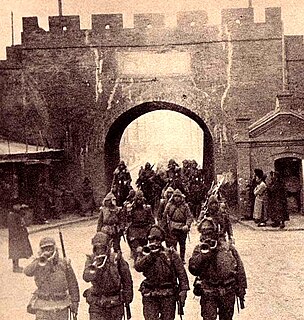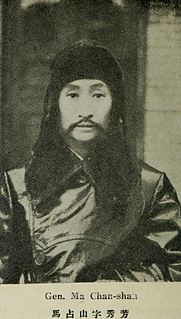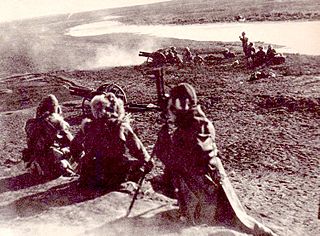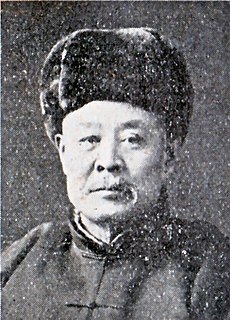This article includes a list of references, but its sources remain unclear because it has insufficient inline citations .(March 2013) (Learn how and when to remove this template message) |
The Northeast People's Anti-Japanese Volunteer Army was led by Tang Juwu, formerly the commander of a Northeastern infantry regiment, interned by the Japanese at the beginning of the invasion of Manchuria. It was created by the Northeast National Salvation Society that had appointed Tang as commander following his escape from the Japanese, and helped him link with the local forces which others were organising. Tang also made use of his personal contacts with police chiefs, officials, local gentry militias and the leaders of the Big Swords Society. Tang was able to organize a force which threatened the region to the east of Mukden and communications with Korea.
Tang Juwu, Tang Chu-wu,唐聚五,(1898–1939), Chinese officer, general of one of the Anti-Japanese Volunteer Armies resisting the pacification of Manchukuo.

Infantry is the branch of an army that engages in military combat on foot, distinguished from cavalry, artillery, and tank forces. Also known as foot soldiers, infantry traditionally relies on moving by foot between combats as well, but may also use mounts, military vehicles, or other transport. Infantry make up a large portion of all armed forces in most nations, and typically bear the largest brunt in warfare, as measured by casualties, deprivation, or physical and psychological stress.

Internment is the imprisonment of people, commonly in large groups, without charges or intent to file charges, and thus no trial. The term is especially used for the confinement "of enemy citizens in wartime or of terrorism suspects". Thus, while it can simply mean imprisonment, it tends to refer to preventive confinement, rather than confinement after having been convicted of some crime. Use of these terms is subject to debate and political sensitivities.
In May 1932, Tang Juwu ordered his 20,000-man army to go on the offensive, besieging Tonghua. The Japanese were unable to defeat Tang, and his force threatened the region to the east of the important city of Mukden and communications with Korea. Based in the Tonghua area, his army fought with the Japanese Kwantung Army stationed in Shenyang and the Manchukuon army of South Liaoning province. Although all major cities had been lost, the volunteer armies gained a new lease of life during the summer of 1932 and reached their greatest strength.

Tonghua is an industrial city in the south of Jilin province, People's Republic of China. It borders North Korea's Chagang Province to the south and southeast, Baishan to the east, Jilin City to the north, Liaoyuan to the northwest, and Liaoning province to the west and southwest. Administratively, it is a prefecture-level city with a total population of 2,325,242 living in an area of 15,195 square kilometres (5,867 sq mi). Urban population is 506,877. It is known as one of the five medicine production centres in China.
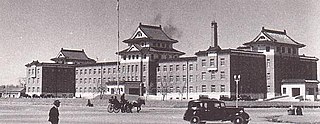
The Kwantung Army was an army group of the Imperial Japanese Army in the first half of the 20th century. It became the largest and most prestigious command in the IJA. Many of its personnel, such as Chiefs of staff Seishirō Itagaki and Hideki Tōjō were promoted to high positions in both the military and civil government in the Empire of Japan and it was largely responsible for the creation of the Japanese-dominated Empire of Manchuria. In August 1945, the army group, around 713,000 men at the time, was defeated by and surrendered to Soviet troops as a result of the Manchurian Strategic Offensive Operation.

Shenyang, formerly known by its Manchu name Mukden or Fengtian, is the provincial capital and the largest city of Liaoning Province, People's Republic of China, as well as the largest city in Northeast China by urban population. According to the 2010 census, the city's urban area has 6.3 million inhabitants, while the total population of the Shenyang municipality, which holds the administrative status of a sub-provincial city, is up to 8.1 million. Shenyang's city region includes the ten metropolitan districts of Shenyang proper, the county-level city of Xinmin, and two counties of Kangping and Faku.
On October 11, 1932, two Japanese cavalry brigades, one mixed brigade, and seven Manchukuo puppet brigades attacked Tang Juwu's forces in Tonghua and Hengren area. [1] The threat of Japanese aerial bombardment of Tonghua forced Tang to withdraw from it in order to spare the civilian population. After the defection of the Manchukuoan 37th Route commander Wang Yongcheng, Tang Juwu was able to break through the Japanese encirclement to the west and escape. On October 16 the Japanese took over Tonghua, and on the 17th, Hengren, with casualties of 500 men. Tang and the remainder of his force eventually were forced to flee into Rehe.

Cavalry or horsemen are soldiers or warriors who fight mounted on horseback. Cavalry were historically the most mobile of the combat arms. An individual soldier in the cavalry is known by a number of designations such as cavalryman, horseman, dragoon, or trooper. The designation of cavalry was not usually given to any military forces that used other animals, such as camels, mules or elephants. Infantry who moved on horseback, but dismounted to fight on foot, were known in the 17th and early 18th centuries as dragoons, a class of mounted infantry which later evolved into cavalry proper while retaining their historic title.

Manchukuo was a puppet state of the Empire of Japan in Northeast China and Inner Mongolia from 1932 until 1945. It was founded as a republic, but in 1934 it became a constitutional monarchy. It had limited international recognition and was under the de facto control of Japan.
